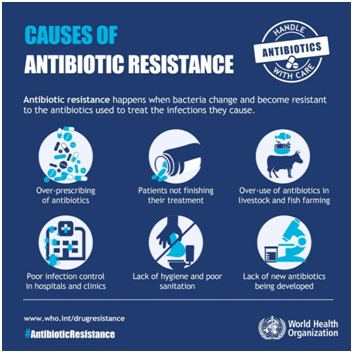

3rd March 2022 (9 Topics)
Context
Recently, a report titled, “Global burden of bacterial antimicrobial resistance in 2019 (GRAM)” has been published.
About
About antimicrobial resistance:
- Antimicrobial Resistance (AMR) occurs when bacteria, viruses, fungi and parasites change over time and no longer respond to medicines making infections harder to treat and increasing the risk of disease spread, severe illness and death.
- As a result of drug resistance, antibiotics and other antimicrobial medicines become ineffective and infections become increasingly difficult or impossible to treat.
- AMR has emerged as one of the leading public health threats of the 21st century.

India’s NAP- National Action Plan to fight against AMR:
- The World Health Organization is also coordinating a global campaign “Handle with care” to raise awareness and encourage best practices for antibiotic use.
- In India, the government has launched a National Action Plan on Antimicrobial Resistance (NAP-AMR) as well.
NAP-AMR (2017–2021):
- India’s NAP- National Action Plan to combat Antimicrobial Resistance goes hand in hand with the World Health Organization’s Global Action Plan (GAP) for AMR.
- The plan is very comprehensive and covers all the five major objectives listed in GAP along with one added objective to strengthen India’s leadership on AMR.
- This plan aims to target all the human and non-human sectors affected by AMR.
- The target period to achieve these goals have been listed as short-term (ending within one year), medium-term (between one to three years) and long term (more than three years).


